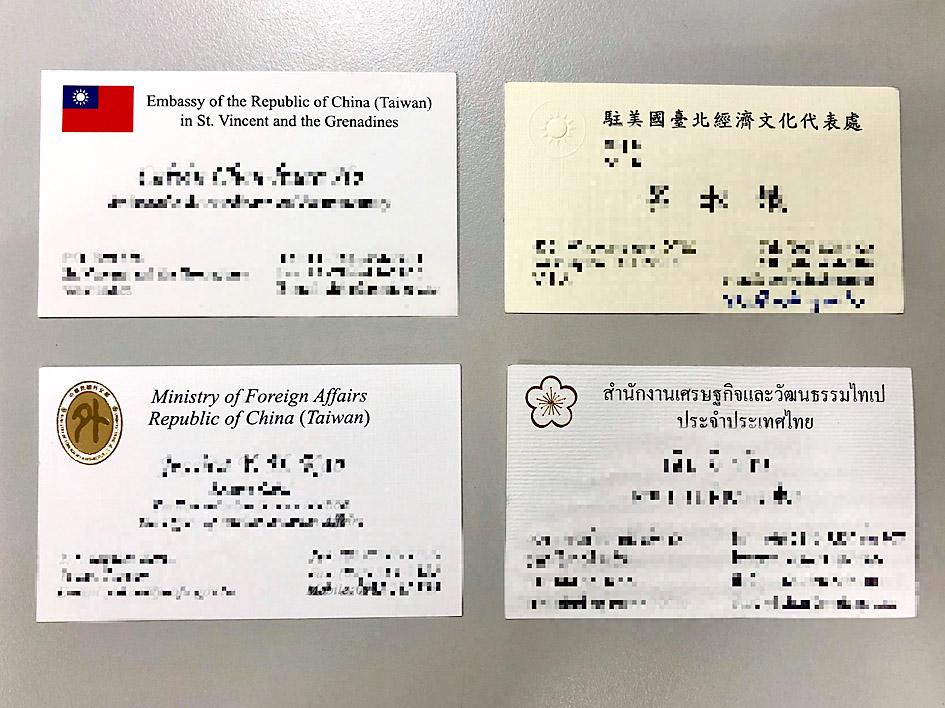The Ministry of Foreign Affairs (MOFA) yesterday denied media reports that it required embassies not to use “Taiwan” on staff name cards, saying the redesign of the cards has not been finalized.
The ministry on Friday last week notified embassies and consulate offices of new name card format standards, the Chinese-language Liberty Times (the Taipei Times’ sister paper) reported yesterday.
The notification, citing standards adopted in August 2011 during former president Ma Ying-jeou’s (馬英九) administration, listed the emblems for the card, without including the name of Taiwan.

Photo: Lu Yi-hsuan, Taipei Times
The move raised questions about whether the ministry was trying to force those who had added “Taiwan” to their cards to remove it, the paper reported.
The ministry has not required overseas officials to “correct” or not to use “Taiwan” on their cards, ministry spokeswoman Joanne Ou (歐江安) said yesterday.
The card standards have not been finalized and further interagency negotiations are required, she said.
The ministry had sent samples of the new designs “for reference,” as lawmakers have required that it unify the card formats, Ou said.
Existing practices, the varying situations in different countries, and highlighting Taiwan’s global recognition were factors being considered in the redesign, she said.
The nation’s formal documents for other countries — those with formal ties and some without — used “Republic of China (Taiwan)” as the nation’s name, she said.
For countries without formal ties or where the name Republic of China is not recognized, the nation’s representation is more flexible and depends on the attitude of those countries, she added.
The Executive Yuan also denied imposing any restrictions on the ministry’s use of “Taiwan” on diplomats’ name cards, adding that it would set up a task force to review the design of ministry’s cards and the cover of the nation’s passport, as well as a suggestion to rename China Airlines.
President Tsai Ing-wen (蔡英文) yesterday said that the “Taiwan” designation has been “quite commonplace” in the government’s diplomatic documents and has helped boost the nation’s visibility.
Representative to Germany Shieh Jhy-wey (謝志偉) on April 21 wrote on Facebook that Chinese Nationalist Party (KMT) Legislator Charles Chen (陳以信) had questioned the ministry about his name card, which reads “Reprasentant von Taiwan.”
Chen wrote on Facebook yesterday that what he meant to emphasize was that unifying name card formats is something the ministry should have done, and he had not demanded that the ministry remove references to Taiwan.
Democratic Progressive Party Legislator Wang Ting-yu (王定宇) wrote on Facebook that there is “too much China, too little Taiwan” in the ministry’s representation system.
The ministry should allow foreigners to differentiate between Taiwan and China and clearly embody the nation with a population of nearly 23.6 million people.
Additional reporting by Sean Lin

Chinese spouse and influencer Guan Guan’s (關關) residency permit has been revoked for repeatedly posting pro-China videos that threaten national security, the National Immigration Agency confirmed today. Guan Guan has said many controversial statements in her videos posted to Douyin (抖音), including “the red flag will soon be painted all over Taiwan” and “Taiwan is an inseparable part of China,” and expressing hope for expedited reunification. The agency last year received multiple reports alleging that Guan Guan had advocated for armed reunification. After verifying the reports, the agency last month issued a notice requiring her to appear and explain her actions. Guan

GIVE AND TAKE: Blood demand continues to rise each year, while fewer young donors are available due to the nation’s falling birthrate, a doctor said Blood donors can redeem points earned from donations to obtain limited edition Formosan black bear travel mugs, the Kaohsiung Blood Center said yesterday, as it announced a goal of stocking 20,000 units of blood prior to the Lunar New Year. The last month of the lunar year is National Blood Donation Month, when local centers seek to stockpile blood for use during the Lunar New Year holiday. The blood demand in southern Taiwan — including Tainan and Kaohsiung, as well as Chiayi, Pingtung, Penghu and Taitung counties — is about 2,000 units per day, the center said. The donation campaign aims to boost

The Kaohsiung Tourism Bureau audited six hotels in an effort to prevent price gouging ahead of Korean band BTS’ concert tour in the city scheduled for Nov. 19, 21 and 22 this year. The bureau on Friday said that the audits — conducted in response to allegations of unfair pricing posted on social media — found no wrongdoing. These establishments included the local branches of Chateau de Chine, Hotel Nikko, My Humble House, and Grand Hai Lai, it said, adding that the Consumer Protection Commission would have penalized price gougers had the accusations been substantiated. The bureau said the Tourism Development Act

The military yesterday said it has located the flight data recorder, or black box, of an F-16V jet that disappeared off eastern Taiwan earlier this month, and it would soon deploy a salvage team to try to retrieve it. Air Force Command Headquarters said that while it had pinned down the location of the black box, it was still searching for the aircraft’s sole pilot, air force Captain Hsin Po-yi (辛柏毅). Without providing details, the air force said it had located the black box days after detecting some intermittent signals and would now engage a team of professionals to retrieve it. The air